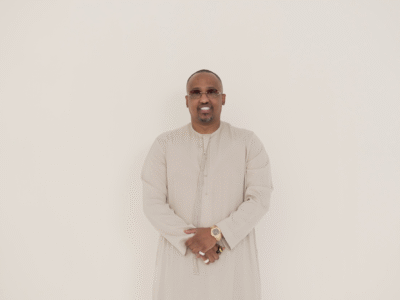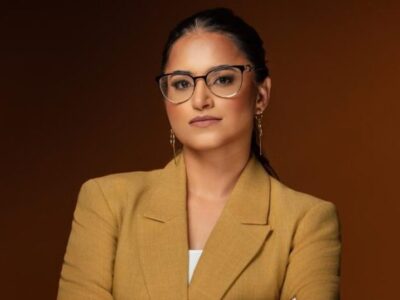
Innovation rarely comes from following a straight line. It comes from professionals who move between industries, challenging norms in finance, real estate, and technology with equal precision. As the UAE sharpens its position as a global business hub, a new breed of leaders is emerging—those who understand that growth depends not just on scale, but on systems, governance, and a relentless ability to spot what others miss. From auditing institutions to developing patented technologies in consumer markets, success today demands a hybrid mind: strategic, ethical, and impatient with slow-moving conventions.
One of the standout figures shaping this multi-sector evolution is Amer Al Ahbabi. With leadership roles spanning real estate, investment, technology, and government auditing and heading ventures like Vertix Holdings, Capstone Real Estate,and Capstone London, he represents a new model of Emirati entrepreneurship—rooted in rigor but built for speed and innovation. Certified as both a management accountant and a data scientist, Al Ahbabi moves with ease between the operational details and the bigger strategic picture, always looking for the next structural advantage.
In this interview, he shares how he designs his role across multiple organizations, the invisible factors he looks for in a business opportunity, and the mindset that drives his ventures beyond traditional models. His insights offer a rare look inside the thought process of an executive who is not just participating in the UAE’s future economy, but actively engineering it.
Navigating Two Worlds: Government Precision and Private Sector Agility
We began by asking him about one of the most distinctive features of his career—his ability to operate successfully across both government and private sectors, industries that often demand conflicting mindsets.
“In the government sector, structure and long-term accountability drive every decision. In the private sector, it’s about agility, competition, and timing. Navigating both requires adaptability and clarity of purpose. I approach government roles with a mindset rooted in governance, compliance, and sustainable impact. On the private side, I focus on innovation, market responsiveness, and calculated risk. The common thread is integrity—it’s the compass that guides decisions across both spheres. Embracing both worlds has helped me build ventures that are bold, but grounded.” Al Ahbabi shared with us when explaining how real leadership isn’t about picking a side. It’s about mastering both structure and speed—and knowing exactly when to lean into each.
The Invisible Factors That Signal a Real Opportunity
While many investors focus on metrics and forecasts, Al Ahbabi’s approach cuts deeper. For him, success starts long before the spreadsheets—rooted in human resilience, perfect timing, and the unseen emotional pull of an idea.
“Beyond the numbers and the pitch, I look for three things: founder mindset, market timing, and behavioral alignment. A pitch deck can be perfect, but if the founders aren’t resilient or adaptable, it’s a red flag. I also ask: is this solution aligned with macro trends—policy shifts, lifestyle changes, or unmet human needs? And finally, I watch how people react to the idea emotionally. If there’s natural traction—interest without marketing—that’s usually a sign the opportunity is real.”
Research from organizations like CB Insights and Idealab supports Al Ahbabi’s view: founder resilience, market timing, and early organic traction are consistently cited among the top predictors of business success.
The Dual Lens: Precision and Ethics in High-Growth Decision Making
Al Ahbabi’s unique blend of technical expertise and ethical rigor informs his approach to company-building. By applying data-driven precision to decision-making while safeguarding against potential risks, he ensures that his ventures are not just successful, but built to last.
“Being a certified data scientist and fraud examiner gave me more than skills—they shaped my decision-making philosophy. Data science trains you to spot patterns and uncover insights, while fraud examination forces you to question motives, assess risks, and protect against blind spots. Together, they help me build companies with both precision and principles. I look beyond revenue forecasts to evaluate transparency, governance, and long-term alignment. In fast-growth environments, ethics aren’t optional—they’re the foundation for sustainable success.”
Designing Leadership for Scale: Avoiding Bottlenecks Without Losing Culture
Al Ahbabi’s leadership approach reveals a strategic balance—he consciously designs his role to ensure vision and culture flow from the top without suffocating the innovation happening within the ranks.
“Every organization I lead starts with a question: what is the one thing only I can do? My role is to set direction, define the culture, and empower the right people to lead execution. I delegate with structure—clear responsibilities, transparent systems, and trust-based leadership. I avoid micromanagement by building strong teams and creating a culture where everyone understands the “why,” not just the “what.” That allows me to scale without losing the soul of the company.” he shared.
By focusing on clarity and trust, he avoids the bottlenecks that often stifle growth, allowing companies to scale rapidly while maintaining core values.
Timing, Personalization, and the Power of Patented Disruption
In a rapidly evolving market, even the most innovative ideas can falter if the timing isn’t right. Al Ahbabi’s experience with his dining-tech startup, ITSS, highlights how crucial timing and market readiness are to the success of disruptive solutions. His venture into the dining space taught him a valuable lesson on the importance of aligning innovation with consumer behavior and infrastructure readiness.
“In 2016, I noticed a shift—people wanted more control, personalization, and speed in dining. This led to Egrab, a dining-tech app we launched. The idea was strong, but we were too early—the market, infrastructure, and consumer behavior weren’t ready. I learned that timing is crucial; even the best ideas need the right environment to thrive. Now, I evaluate opportunities based on innovation, timing, scalability, and emotional traction. When those align, I go all in.”
While the concept behind Egrab was ahead of its time, it set the stage for a deeper understanding of how critical market readiness is to the success of any disruptive idea. Now, his strategy is to ensure that when the conditions align—innovation, timing, and emotional traction—he’s ready to fully commit.
Building Resilience Through Professional Leadership and Policy Engagement
Beyond his executive ventures, Amer Al Ahbabi also plays a critical role in shaping regional finance and governance frameworks through his leadership in the Institute of Management Accountants (IMA). His positions, as Global Board Director, President of the Abu Dhabi Chapter, and a member of the IMA Regional Advisory Committee for the Middle East and Africa, have given him a rare vantage point on how professional institutions can influence national and regional economic agendas.
“Serving in leadership roles across the global, regional, and local levels of the IMA has given me a comprehensive perspective on how finance and governance frameworks are evolving worldwide. Through my position on the Global Board and as a Regional Advisory Committee member for the Middle East and Africa, I’ve had the opportunity to contribute to strategic dialogues that address both global priorities and regional challenges. This experience has deepened my understanding of how the UAE—anchored in innovation, economic diversification, and future-ready leadership—is playing a pivotal role in shaping the region’s economic narrative.”
He also underscores the importance of institutions like the IMA in enabling long-term sustainability—not just through credentialing, but by aligning ethical standards and talent development with broader policy objectives.
“Professional bodies like the IMA are key enablers in this landscape. They serve as bridges between policy, practice, and talent—advancing ethical standards, professional development, and strategic competencies. In the UAE and across the Middle East and Africa, we’ve seen how collaboration with such institutions can accelerate capacity building and foster ecosystems rooted in integrity, innovation, and resilience. By equipping professionals with globally recognized certifications and insights, organizations like the IMA help drive sustainable business growth and ensure the region remains competitive in a rapidly changing world.”
From Local Foundations to Global Launchpads: The Shifting Terrain of UAE Entrepreneurship
Born and raised in Abu Dhabi, Amer Al Ahbabi has witnessed firsthand the UAE’s rapid evolution into a dynamic hub for entrepreneurship. What was once a relatively limited landscape, with few accelerators and venture capital options, has become a thriving ecosystem defined by innovation, youth empowerment, and forward-thinking policy.
“When I first started, the startup landscape was relatively limited,” he recalls. “There were fewer accelerators, limited access to venture capital, and more regulatory barriers.”
But over the past decade, that picture has shifted dramatically. Government-backed initiatives like Hub71, the Golden Visa for entrepreneurs, and the rise of startup-focused free zones have made it easier than ever for early-stage ventures to find their footing.
Indeed, Amer’s observations are supported by hard data. In 2024, startups supported by Abu Dhabi’s Hub71 ecosystem alone raised AED 8.02 billion (USD 2.17 billion) and generated AED 4.5 billion (USD 1.2 billion) in revenue—a 44.7% year-on-year increase in funding, according to Hub71’s latest Impact Report. These figures reflect the very strategies he highlights, including programs like the Golden Visa, the rise of free zones designed for startups, and the creation of support platforms like Hub71+.
More than infrastructure, however, Al Ahbabi sees a deeper transformation at work: “We’ve seen a cultural shift that encourages young Emiratis to become job creators, not just job seekers.” This change in mindset, toward embracing risk and innovation, has fueled a generation of founders eager to shape the future.
Yet, challenges persist. Many startups still struggle with early-stage funding, scaling beyond local markets, and navigating regulatory compliance. Al Ahbabi believes the solution lies in building smarter bridges: “The next decade will be about smart partnerships, between the private sector, government, and global investors.”
For him, the UAE’s evolution isn’t just about growth, it’s about positioning. “The UAE is no longer just a hub for business—it’s becoming a launchpad for global innovation,” he says. And with leaders like Al Ahbabi at the helm, that trajectory shows no signs of slowing down.
Innovation with Intention: Turning Everyday Friction into Scalable Solutions
Amer Al Ahbabi’s approach to innovation doesn’t begin in a boardroom—it starts with a question.
“I pay close attention to inefficiencies in everyday life… and ask: Why hasn’t this been solved yet?” he explains. Whether it’s a broken process in business or a frustrating customer experience, Al Ahbabi views friction as a signpost for opportunity.
His dual fluency in finance and technology gives him a unique edge.
“My background in finance helps me assess the economic viability of ideas, while my interest in technology pushes me to think beyond traditional solutions,” he shares. This combination of analytical discipline and creative thinking has become a hallmark of his ventures.
A perfect example is his patented dining solution—what started as a moment of personal frustration was transformed into a product that integrated smart design with real-world needs.
“It wasn’t just about solving a problem—it was about enhancing user experience through intelligent design and smart integration,” Amer notes.
But for him, innovation is not innovation for its own sake.
“Ultimately, I believe innovation must serve a purpose. It should simplify, elevate, or transform.”
This clarity of intent is what guides him from concept to execution. Each venture he leads follows a disciplined path: identify gaps, validate with data, and build with scalability in mind.
“In fast-changing markets,” he adds, “success depends on timing, the right people, and the discipline to balance creativity with execution.” It’s that structured approach to disruption that continues to set his work apart—and makes him a leading figure in the region’s innovation economy.
Amer Al Ahbabi’s approach to leadership and innovation is a model for navigating the complexities of today’s fast-paced, multi-sector world. By blending ethical rigor with a data-driven, strategic mindset, he has consistently turned opportunities into high-growth ventures. His insights highlight the importance of timing, founder resilience, and emotional alignment, showing that success is built on more than just the numbers—it’s about mastering the right mindset for the right moment. As the UAE continues to position itself as a global leader, Amer’s innovative approach is a clear example of how entrepreneurs can shape the future with precision and integrity.














